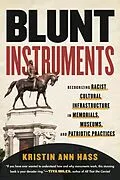A field guide to the memorials, museums, and practices that commemorate white supremacy in the United States-and how to reimagine a more deeply shared cultural infrastructure for the future
Cultural infrastructure has been designed to maintain structures of inequality, and while it doesn't seem to be explicitly about race, it often is. Blunt Instruments helps readers identify, contextualize, and name elements of our everyday landscapes and cultural practices that are designed to seem benign or natural but which, in fact, work tirelessly to tell us vital stories about who we are, how we came to be, and who belongs.
Examining landmark moments such as the erection of the first American museum and Colin Kaepernick's kneeling pledge of allegiance, historian Kristin Hass explores the complicated histories of sites of cultural infrastructure, such as:
· the American Museum of Natural History
· the Bridge to Freedom in Selma
· the Washington Monument
· Mount Auburn Cemetery
· Kehinde Wiley's 2019 sculpture Rumors of War
· the Victory Highway
· the Alamo Cenotaph
With sharp analysis and a broad lens, Hass makes the undeniable case that understanding what cultural infrastructure is, and the deep and broad impact that it has, is essential to understanding how structures of inequity are maintained and how they might be dismantled.
Autorentext
Kristin Ann Hass is a Professor in the Department of American Culture and Director of the Humanities Collaboratory at the University of Michigan. She has written two books, Sacrificing Soldiers on the National Mall and U.S. nationalism and Carried to the Wall: American Memory and the Vietnam Veterans Memorial. She was also the co-founder and Associate Director of Imagining America: Artists and Scholars in Public Life.
Klappentext
How monuments, museums, and everyday patriotic practices serve to uphold white supremacy in the United States
Cultural infrastructure has been designed to maintain structures of inequality and while they don't seem to be explicitly about race, they often are.
Blunt Instruments looks at three categories of cultural infrastructure: memorials and monuments, museums, and everyday patriotic practices. Each of these have been very much in the news for most of the twenty-first century. In fact, more intense, riotous, fraught attention has been paid to them in the last 20 years than in most of the first 200 years of American life. And yet, they are seldom looked at together or understood explicitly as tools used by particular people at certain times and places to shape the culture.
Blunt Instruments helps readers identify, contextualize, and name elements of our everyday landscapes and cultural practices that are designed to seem benign or natural but which, in fact, work tirelessly to tell us vital stories about who we are, how we came to be, and who belongs. Examining landmark moments such as the erection of the first American museum and Colin Kaepernick's kneeling pledge of allegiance, historian Kristin Hass explores the complicated histories of sites of cultural infrastructure from the Robert E. Lee statue to the Bridge to Freedom in Selma, from the Vietnam Veterans Memorial to Kehinde Wiley's 2019 sculpture, Rumors of War.
With sharp analysis and a broad lens, Hass makes the undeniable case that understanding what cultural infrastructure is and the deep and broad impact that it has is essential to understanding how structures of inequity are maintained and how they might be dismantled.
